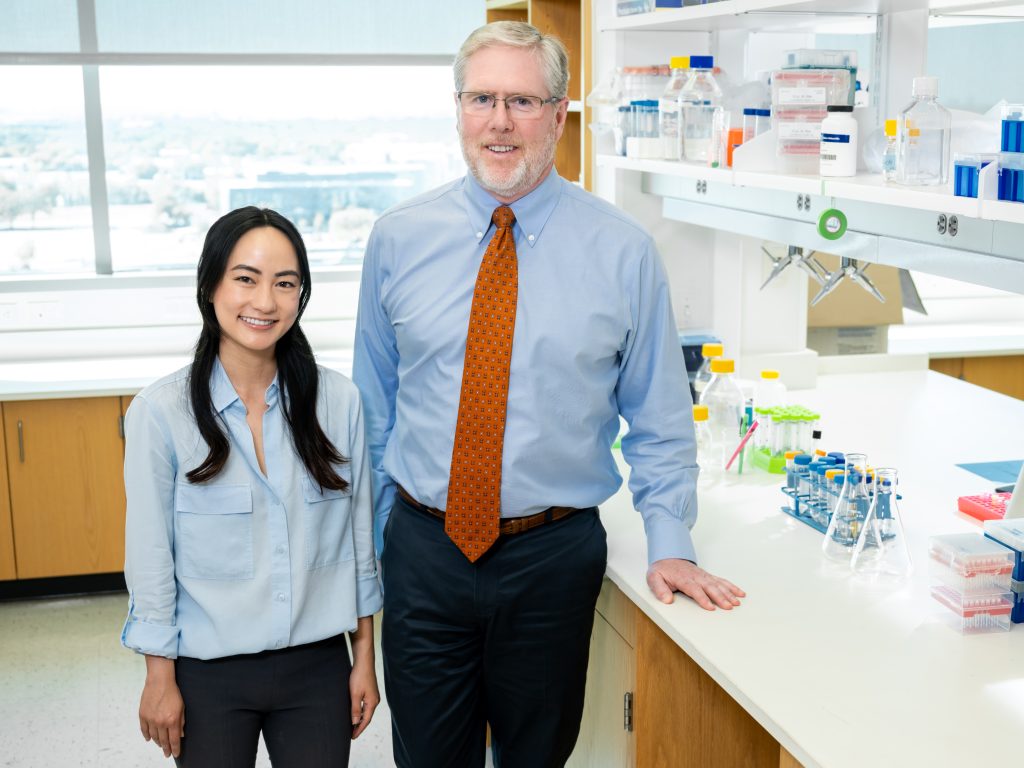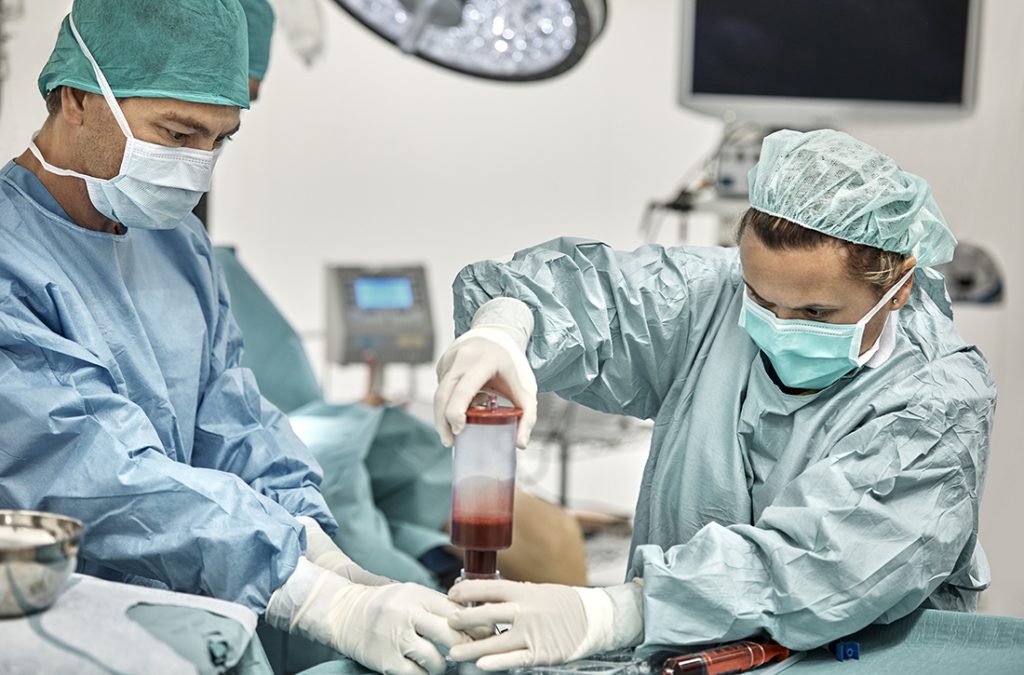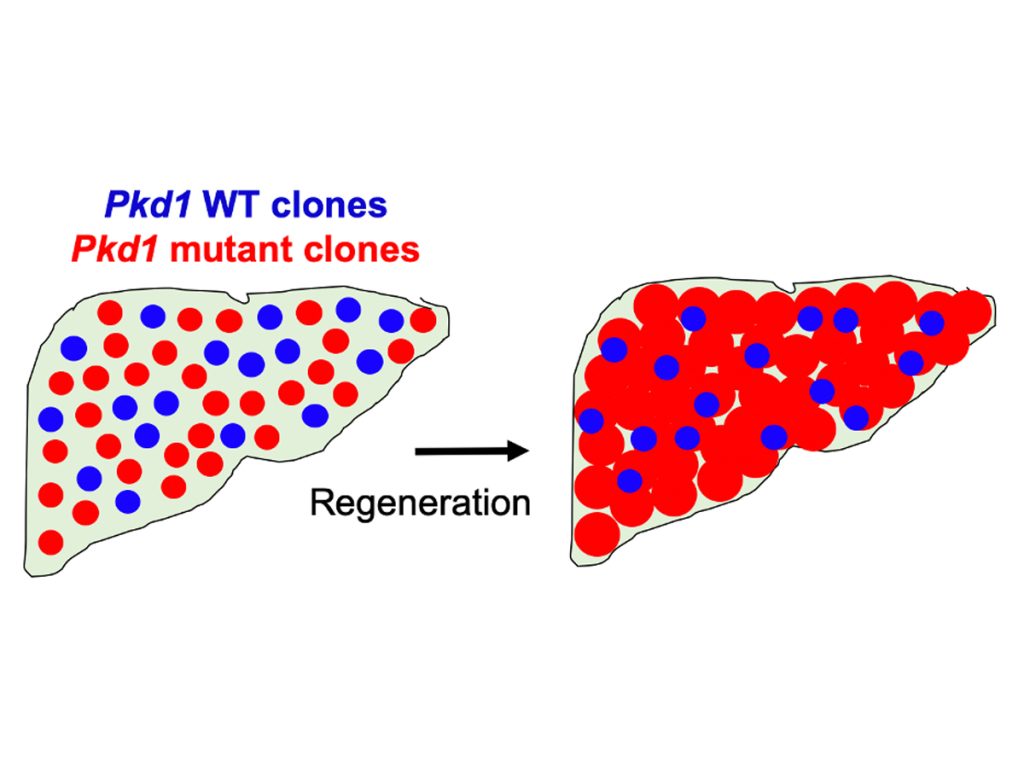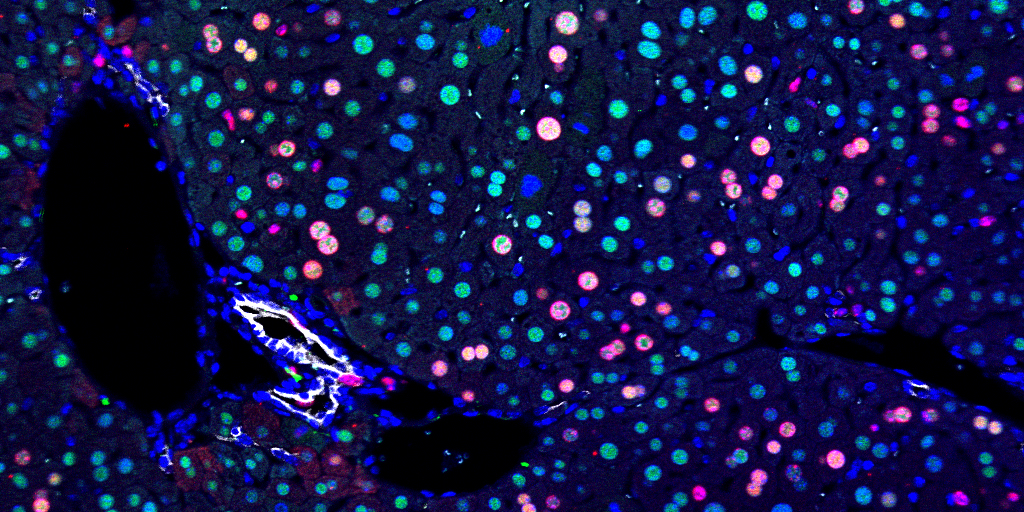
Julia Phan, Ph.D., and Sean J. Morrison, Ph.D., Director of Children’s Medical Center Research Institute at UT Southwestern and Professor of Pediatrics.
Study published in Science shows humans co-opted retrotransposons to avoid anemia during pregnancy
DALLAS – Oct. 24, 2024 – Ancient viral remnants in the human genome are activated during pregnancy and after significant bleeding in order to increase blood cell production, an important step toward defining the purpose of “junk DNA” in humans, according to new research from Children’s Medical Center Research Institute at UT Southwestern (CRI) published today in Science.
Sean J. Morrison, Ph.D., Director of CRI and a Howard Hughes Medical Institute Investigator, and first author Julia Phan, Ph.D., set out to discover how hematopoietic, or blood-forming, stem cells – which typically divide infrequently – are activated during pregnancy and after blood loss. When they compared activated genes in stem cells from pregnant versus nonpregnant mice, they found retrotransposons had switched on in stem cells from pregnant mice.
Retrotransposons are ancient viral gene sequences now permanently part of our genome and sometimes called “junk DNA” because they don’t encode proteins that contribute to cellular function. They use an enzyme called reverse transcriptase, just like the human immunodeficiency virus (HIV), to replicate themselves.
Humans have evolved mechanisms to keep retrotransposons turned off, most of the time, because retrotransposons have the ability to damage DNA when they replicate and reinsert into other parts of the genome.
“It’s the opposite of what we expected. If there’s ever a time to protect the integrity of the genome and avoid mutations, it would be during pregnancy,” Dr. Morrison said. “There are hundreds of these retrotransposon sequences in our genome. Why not permanently inactivate them, like some species have done? They must have some adaptive value for us.”
Drs. Morrison and Phan used reverse transcriptase inhibiting drugs, commonly used to suppress HIV replication in patients, to inhibit the replication of retrotransposons in mice. These drugs did not alter blood cell production in normal mice but blocked the increase in blood-forming stem cells and red blood cell production during pregnancy, leading to anemia.
As researchers further explored mechanisms activating blood cell production, they found retrotransposons were being detected by the immune sensors, cGAS and STING. These sensors induce interferon production after viral infection or replication of retrotransposons.
“We thought interferon might cause the stem cells to be killed by the immune system. But we found the retrotransposons turned on just enough interferon to activate blood cell production,” said Dr. Phan, a former graduate student in CRI’s Morrison Lab.

Alpaslan Tasdogan, M.D., Ph.D., is Professor of Dermatology at University Hospital Essen in Germany.
When Drs. Phan and Morrison inhibited cGAS, STING, or interferon, there was little or no effect on stem cells or blood cell production in normal mice. But in pregnant mice, this blocked the increase in stem cell numbers and blood cell production, leading to anemia.
Dr. Phan performed similar analyses on blood samples from pregnant women, including three people being treated with reverse transcriptase inhibitors, by collaborating with former Morrison Lab postdoctoral fellow Alpaslan Tasdogan, M.D., Ph.D., now a Professor of Dermatology at University Hospital Essen in Germany. Together, they found retrotransposons and interferon are also activated in human blood-forming stem cells during pregnancy, in addition to being necessary to avoid anemia.
“We are extremely excited that what Dr. Morrison and Dr. Phan discovered in mice is also true in humans. These insights help us understand some of the underlying mechanisms that contribute to anemia during pregnancy,” Dr. Tasdogan said. “Our next step is to initiate a clinical trial to deepen our understanding of how retrotransposons function in patients.”
This research builds on the Morrison Lab’s previous discovery that estrogen contributes to blood-forming stem cell activation during pregnancy.
“This work changes the way we think about mechanisms that regulate tissue regeneration. We’ve only shown it so far in the blood-forming system, but we speculate other kinds of stem cells also co-opt retrotransposons and immune sensors to activate stem cells during tissue regeneration,” Dr. Morrison said.
Dr. Phan is part of UT Southwestern’s Perot Family Scholars Medical Scientist Training Program, which offers a combined M.D./Ph.D. degree. She received her Ph.D. in genetics, development, and disease in August and now is completing the final two years of study for her medical degree.
In addition to his role as founding Director of CRI, Dr. Morrison is a Professor in CRI and of Pediatrics at UT Southwestern. He holds the Kathryne and Gene Bishop Distinguished Chair in Pediatric Research at CRI and the Mary McDermott Cook Chair in Pediatric Genetics. He is a Cancer Prevention and Research Institute of Texas (CPRIT) Scholar in Cancer Research and member of the Harold C. Simmons Comprehensive Cancer Center at UT Southwestern.
Other study contributors include Zhiyu Zhao, Ph.D., Assistant Professor in CRI and of Pediatrics, and Marcel Mettlen, Ph.D., Associate Professor of Cell Biology. Dr. Mettlen is also Director of the Quantitative Light Microscopy Core Facility at UTSW and a member of the Cellular Networks in Cancer Research Program at the Simmons Cancer Center.
The research was funded by the Howard Hughes Medical Institute, the National Institute of Diabetes and Digestive and Kidney Diseases, the Kleberg Foundation, the Ministry of Culture and Science of the State of North Rhine-Westphalia, a National Cancer Institute Cancer Center Support Grant, and an Emmy Noether Award from the German Research Foundation.
About CRI
Children’s Medical Center Research Institute at UT Southwestern (CRI) is a joint venture of UT Southwestern Medical Center and Children’s Medical Center Dallas. CRI’s mission is to perform transformative biomedical research to better understand the biological basis of disease. Located in Dallas, Texas, CRI is home to interdisciplinary groups of scientists and physicians pursuing research at the interface of regenerative medicine, cancer biology and metabolism.
X/Twitter | LinkedIn | Instagram | YouTube | Facebook | Website
About UT Southwestern Medical Center
UT Southwestern, one of the nation’s premier academic medical centers, integrates pioneering biomedical research with exceptional clinical care and education. The institution’s faculty members have received six Nobel Prizes and include 25 members of the National Academy of Sciences, 22 members of the National Academy of Medicine, and 14 Howard Hughes Medical Institute Investigators. The full-time faculty of more than 3,200 is responsible for groundbreaking medical advances and is committed to translating science-driven research quickly to new clinical treatments. UT Southwestern physicians provide care in more than 80 specialties to more than 120,000 hospitalized patients, more than 360,000 emergency room cases, and oversee nearly 5 million outpatient visits a year.



